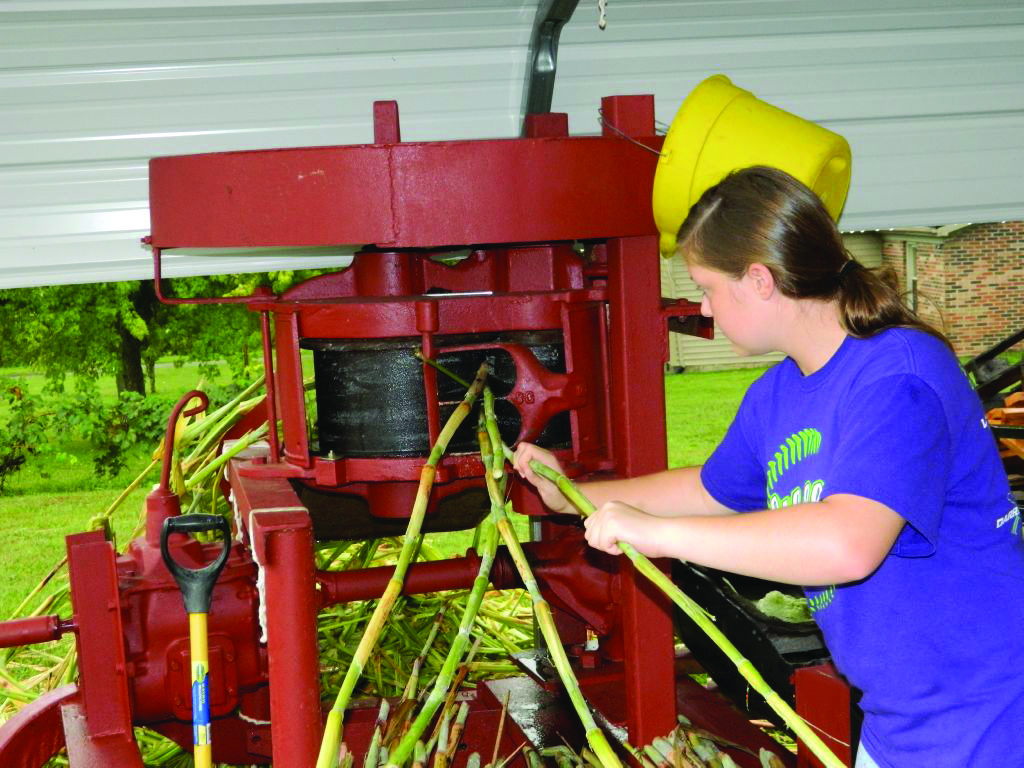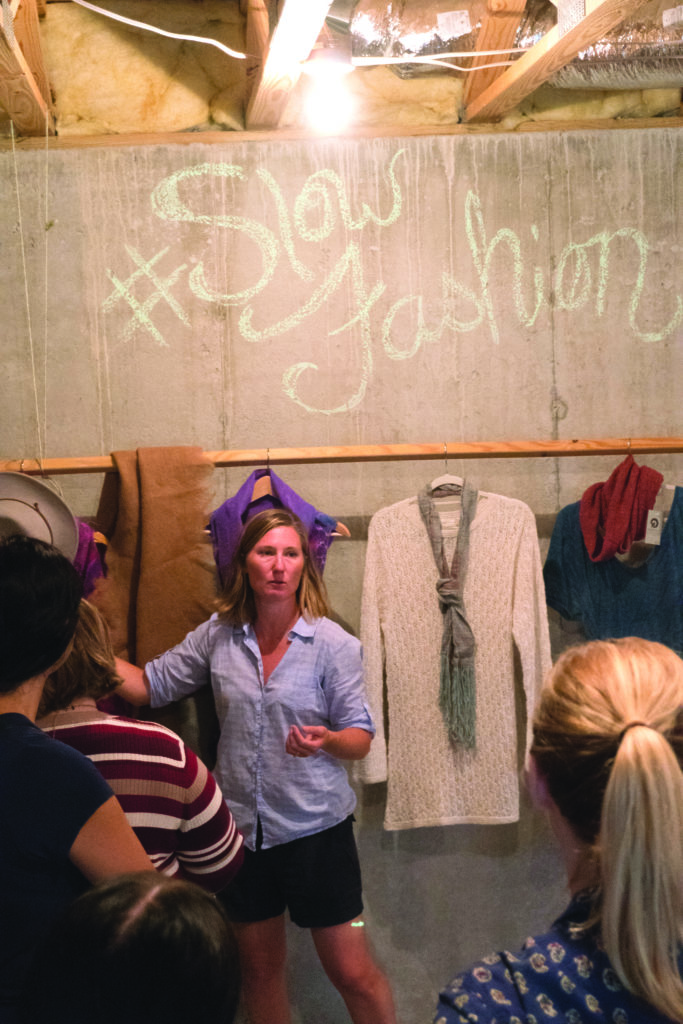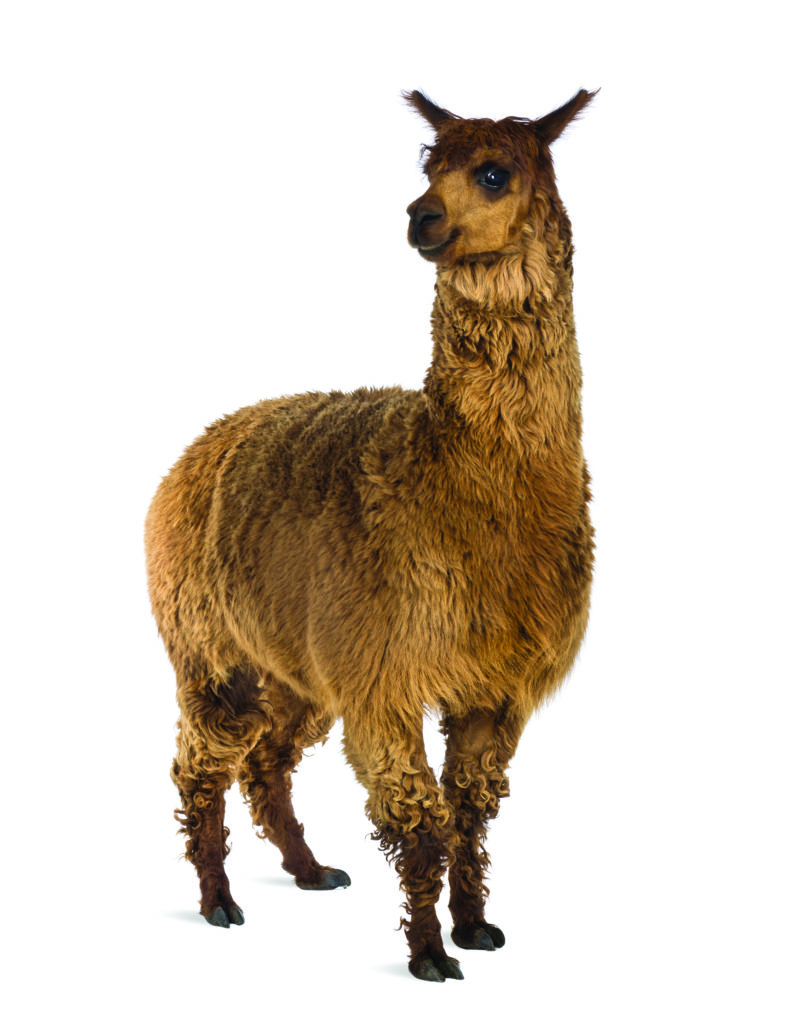Enjoy this excerpt from The Woman Hobby Farmer and their perspectives on securing the future of small farms for all women.

Sorghum farmer Kaitlyn Elliott. All photos courtesy of Fox Chapel publishers.
No matter what you do as a farmer, it’s important that you tell others about it. This book illustrates some of the limitless forms that farm education takes. As women, our roles are limitless as well, giving us opportunities to change the shape of the “good ol’ boys’ club” and reframe the expectations we hold for our successors.
Slow Fashion
Seeing Alvina Maynard teach college merchandising majors about the concept of slow fashion, it is clear that she cares deeply and is passionate about the quality of products she is creating. She wants that to carry on down the chain of production to the consumer. Passion about a topic can be difficult to define, express clearly, and communicate effectively, especially with skeptics.

Alvina teaches students about the concept of “slow fashion”.
On Alvina’s alpaca farm, she has found a great point of entry to help newcomers understand the basics. For her tour groups, Alvina starts with a game. She has a set of hand-drawn cards that she gives out for the group to arrange into chronological order. Each card represents a step in the alpaca-to-textile process. The group quickly learned that the dyes for the wool have certain seasons for harvesting (goldenrod in the fall, for example), that you wash the wool after shearing the animals (rather than wrestling a leggy alpaca into a bathtub), and that you must repeatedly sow grass seed to keep the animals fed.

Lessons Learned
Young women in agriculture relate to their educational experiences and use them to help determine where they want to go in the future. They are making an impact just by being present in conversations, enrolling in classes, marketing their products, and speaking up about their abilities. Kaitlyn Elliott is a fifth-generation sorghum farmer who is studying to become an ag teacher. Why not raise sorghum full time? She says, “I’ll focus more on gardening when I get older. Sorghum is great, but I probably won’t ever get the land, money, and time to live off of it. I’d much rather focus on something that I know will benefit me a lot more.” To her, that means teaching and emulating the influence that some of her best teachers had on her.
Reflections on a Male-Dominated System
Recalling how they’ve been treated by a male-dominated system, the young women I interviewed agreed that they want to see more equal opportunities in the public schools for classes such as construction and welding. Kaitlyn took some of these classes and was definitely a minority in each one. She remembers, “It was a good class, but we weren’t graded equally. We were automatically given an A because we weren’t going to be as good.”
Figuring It Out
Marlen Hammond comments on the culture that surrounds high-school shop classes: “Classes should be required instead of optional, so you don’t feel like you’re the only woman in the class. Everyone should have some kind of mechanical training [so they] know how to change a tire at least.”
Marlen’s colleague Lizzy Guthrie proves that women can figure out mechanical problems. She says, “I remember being broken down in the desert once, completely stuck, and I could not figure out how to get things rolling again. Eventually, I just laid underneath the tractor and read the owner’s manual, and I figured it out. Being put in those scenarios, you don’t really have another option, but it would have been nice to have had specific training on how an engine works.”
Kaitlyn is young, but she’s been working with her grandfather at farmers’ markets long enough to know what the public perception of a female farmer is. She says, “If you have a business with a man, they never refer to you as being part of it. They ask how your dad’s business or your granddad’s business is, not taking into account that you actually do work. If there’s a man, there’s no respect given [to the female]. With sorghum, a lot of people just assume my role is to bottle it and label it. I guess I’m supposed to be like a little housewife. In reality, he’s kicked back in a chair while I’m out there with a machete, cutting the stuff down.” She said that the people with whom she works closely don’t discourage her like those who see her only at the market. “It’s the people who don’t see you working who make it harder because they don’t think women can do that type of work.”
Dealing with Stereotypes
Women have to be prepared on some level to intercept, deflect, and overcome stereotypes. Gender studies specialist and Ph.D. student Katie Ratajczak empathizes with the effects of being pigeonholed with assumptions, and it affects both genders. She asserts, “If you’re interested in farming, not because you want to be the breadwinner and you’re working with the ground as a ‘manly’ thing, but if you want to think of it as becoming in touch with the land, working with it, and returning things to nature, that’s [got] a really feminine orientation to it.”
“Little Lady”
Lisa Munniksma has had mixed reactions from men she interacts with when going to markets in cities like Cincinnati and Louisville. She’s heard the surprised reaction of “Oh, you actually grew this?” and other humorous comments. She tells about a time when she had horses in a half-ton truck and gooseneck trailer. She says, “I pull into the Flying J truck stop, and this guy says, ‘That’s a big rig for a little lady.’ It just made me want to punch the guy in the face.”
It does depend on the person’s intentions, though. Sometimes, a stranger’s comments can actually be encouraging. Lisa recalls a time when she was leaving a market, driving a fifteen-passenger van with a trailer attached. “There was an older man who said, ‘Tell me you’re going out there to drive that van and trailer.’ I told him, ‘Yes, sir, I am.’ And he said, ‘You go get it!’” Lisa smiles at remembering the small boost of encouragement that came her way rather than a condescending attitude.
Lisa laughs about having male friends who call and say, “Hey, I have to do this thing with this trailer. Can you come over and drive this for me?” So, how did she learn to drive big things? She credits two horse trainers, both female, where she boarded her horse for patiently teaching her how to drive and back up trailers.
Mentors
Joscelyn Strange had male mentors in her family, including her dad; in Future Farmers of America (FFA); and in 4-H who taught her about dairy cows, and her mom showed hogs. She says she learned more from men because they were doing what she wanted to do, and she never heard negative comments from her family members about being a female. As she developed her niche of showing cattle, she has seen a big influence from women in the industry. She says, “I see it all the time because I go to dairy shows; nine times out of ten, the people on the halters are women.” Joscelyn is pursuing a degree in animal science. True to her upbringing, she plans on running her own cattle operation and preserving the Ayrshire breed with which her family works intensively.
Great leaders bridge a gap. They illuminate a path that gets you from point A to point B. I often hear the phrase “meet people where they are” from leaders I respect. This openness and adaptability can work wonders with those who are used to more dogmatic leadership styles. Do your best to find common ground with colleagues of both sexes and all types.
Changing the Culture
Changing the culture, changing attitudes, opening up minds, and shifting expectations can really only happen on personal levels and through connections. The women I interviewed all expressed a willingness to work with the masculine and patriarchal systems, as well as individuals, as long as those men were willing to work with the women and hear the women’s point of view as well. I’ll end this chapter with a quote Alvina Maynard shared with me, something she heard at an Empowering Women Veterans conference: “We cannot influence change by damning our neighbors.”
Excerpted from The Woman Hobby Farmer by Karen Lanier. Used with permission from Fox Chapel Publishing.












